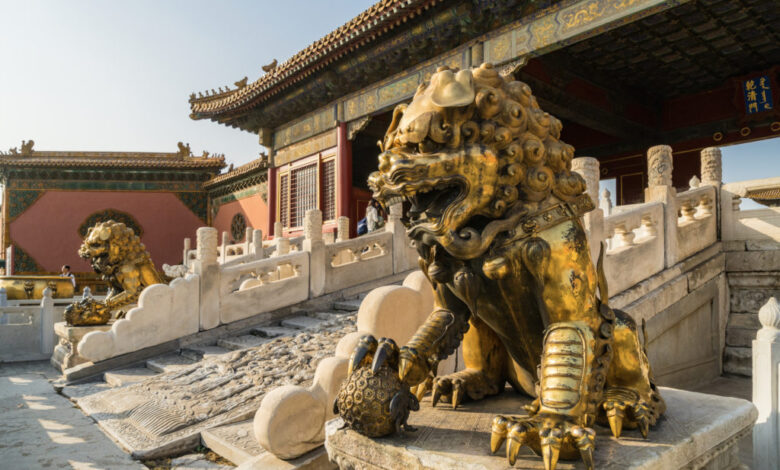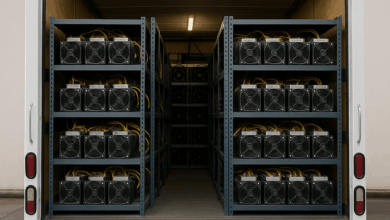Small but vital metals markets are rushing to adapt to the Chinese crackdown

The ban may seem symbolic at first, since restrictions imposed more than a year ago have eliminated direct exports of Chinese gallium and germanium to the United States. This caused prices to rise and made it difficult for traders to acquire buffer stock. However, panic levels are rising, because this time Beijing could further restrict supplies through rules that prohibit foreign companies and countries from helping American manufacturers evade controls.
For example, these measures could prevent international companies from reprocessing Chinese gallium, germanium, and antimony in third countries, and then selling these products to the United States.
The end buyers of these metals – such as the chip, aerospace and defense sectors – may have little choice but to try to use less, recycle more, or strike deals with the few Western companies that are likely to start new production. There are also concerns that other vital materials could be targeted if tensions escalate.
Chinese metal that has been reprocessed elsewhere and redirected to the United States has provided a lifeline to American manufacturers, especially in the gallium market. But those flows are likely to dwindle, as suppliers fear retaliation from Beijing, according to people familiar with the trade, who requested anonymity because of the commercially sensitive nature of the matter.
The small size of those markets and the limited companies involved in them means such sales would be easy to track, and blacklisting China would have huge ramifications for the companies involved, the people said.
Uchi Wakaki, director of overseas business at Wing, Japan’s largest importer of the metal, said it would be relatively easier for China to stop gallium shipments through third countries, since it is a niche market. He said Wing’s imports from China have halved this year due to the indirect impact of trade restrictions.
The impact on supply chains will vary, but traders, analysts and suppliers widely expect Beijing’s ban to materially tighten global markets and boost metal prices in the coming months.
Prices are really high. Germanium – which is more than 300 times more expensive than copper – and antimony set records, while gallium set records. At a 13-year highShows data from Fastmarkets.
Chipmaker Intel Corp said the ban would not significantly threaten production given its global supply sources. But since the restrictions imposed last year, many manufacturers specializing in the sector have warned of the risks of locking out components or selling their products if they become more expensive to manufacture.
These companies include French night vision technology company Exosens SAS, and Lumentum Holdings Inc, which makes lasers for the semiconductor, defense and renewable energy sectors. In some cases, the government has not issued export licenses, and shipments have been delayed, said AXT, a semiconductor manufacturer that produces gallium products in China to supply U.S. factories.
Exosens and Lumentum did not respond to requests for comment about the impact of the ban this month. An AXT spokesperson also did not respond to an email seeking comment, and a message left on the company’s general voicemail went unanswered.
In the long term, industry insiders say the challenge will be securing new or alternative supplies, and finding refineries that can convert them into the highly pure forms that manufacturers need.
There is also the question of whether China could target other goods. It is the dominant supplier of dozens of critical minerals, but analysts and traders focus on those with key applications in the defense sector, which the United States does not produce in large quantities. Possible candidates include hafnium, zirconium, tungsten, titanium and indium, they said.
“Industries that have never had a problem with material availability are suddenly waking up to the fact that there might be a problem,” said Ionut Lazar, principal consultant at CRU Research Group. “For small manufacturers that rely heavily on the availability of these materials — almost regardless of price — this is a concern.”
Drawing on the views of producers, traders, manufacturers and consultants, here’s a detailed breakdown of how China is exposing vulnerabilities in the West’s defense and chip manufacturing supply chains – and the impact:
Gallium
Like fellow secondary metals germanium and antimony, gallium is commonly extracted as a byproduct of mining and refining commodities such as zinc, copper, aluminum and gold.
Total annual gallium production is less than 1,000 tons, with China producing almost all of it. Highlighting the small market, China’s aluminum industry — which pumps out gallium as a byproduct — produces more than 40 million tons each year. The country is so dominant because in addition to being by far the largest aluminum producer, its refineries are also required by law to recover gallium.
“If you really want to strangle the market, it makes sense to start there,” said Jack Bader, founder of critical metals consultancy Project Blue. “We are still far from the levels of muscle that China could flex in this area if it really wanted to.”
International producers could theoretically increase gallium production by investing in methods to extract it as a by-product. Rio Tinto Group He said last week It is studying whether that is worth doing in Canada, and Metlen Energy & Metals SA is exploring something similar in Greece.
Despite the price of gallium, some potential producers are reluctant to invest and are seeking commitments from the US and European governments to finance projects. Some refiners also want minimum price guarantees from manufacturers in exchange for long-term deals, people familiar with the matter said.
This is because suppliers are concerned about the possibility of a collapse in prices if China lifts export restrictions or flows of minerals through blocked channels. This is of particular concern for gallium because China produced more than the world needed before the ban, meaning it risks building a domestic glut.
Germanium
Germanium is one example of how trade restrictions – including sanctions affecting Russian metals and mining – are keeping international traders out of the market, reducing their role as suppliers of last resort in times like these.
Besides a handful of Chinese producers and a few overseas alternative producers, secondary metal supplies have traditionally been controlled by a group of specialist traders operating mainly out of London, New York, Hong Kong and Tokyo.
They have historically built inventories when supplies are plentiful, before waiting — sometimes for years — to sell when the metal becomes scarce.
But since restrictions imposed by China last year, many of the affected metals have been frozen, with customs officials only approving shipments to approved end users, according to people familiar with the matter. Germanium and gallium exports to major warehousing centers for traders in the Netherlands and Hong Kong collapsed to zero, trade data showed. This means that there is less available metal on hand.
Take the family-owned company Susanna Lipman, famous among London’s tight-knit network of small metals dealers for having all the rare earths in stock. Lipmann Walton & Co. is no longer a company. Germanium is on its list, having exited this market for the time being in response to tightening trade restrictions.
“Normally, trading will find a way to solve this kind of shortage if you let it,” said Lipman, whose family has been trading secondary metals for three generations. “In geopolitical crises, the only thing that keeps flowing is usually the metal.”
With traders ill-equipped to fill the gap, manufacturers have been tapping into their buffer stocks, seeking additional supplies from a handful of alternative Western refiners and asking governments for help in building more resilient supply chains.
Beijing’s grip on germanium is looser than it is for gallium, but it remains a concern for the United States as it seeks to become less dependent on Chinese supplies.
Following restrictions imposed by China last year, the Biden administration sent diplomats to Belgium and the Democratic Republic of the Congo to shore up vital mineral supplies to local manufacturers, including defense and space contractors who need highly pure forms of germanium to keep satellites in orbit and missiles on target. .
This is just the beginning of China’s “attempts to assert its dominance over critical minerals,” Jose Fernandez, US Under Secretary of State for Economic Growth, Energy and Environment, said in Brussels this month. “I expect this will not be the last time we need to address this issue.”
The United States once dominated germanium supplies more than China does today. Cold War-era scientists pioneered a process that made it one of the purest substances ever created, with impurities amounting to just one in every 10 trillion atoms.
Umicore SA, which transforms germanium for use in high-tech products such as thermal imaging systems and radiation detectors, has partnered with Congo to process the metal from mine waste dumps there in a deal brokered by US authorities. The key question is how quickly supplies can be boosted.
“This partnership is part of our overall strategy to diversify our supply sources and strengthen the supply chain,” said Umicore, which has historically concluded agreements for large Chinese supplies. “We are confident that our sourcing strategy and supply portfolio are robust enough to secure continuity of operations and supplies for our customers.”
Antimony
Like many secondary metals, antimony — widely used in munitions — has been in oversupply for much of this century, as China’s rapid industrial expansion has boosted production. But that has changed in recent years as the province’s geological reserves have diminished.
While illicit exports through Vietnam in the past have helped ease supply pressures, improved border control and supply chain audits by Western manufacturers have led to a decline in so-called border leaks in recent years, according to the CRU. Looking to the future, such flows are “likely to become more difficult,” said Willis Thomas, principal counsel at CRU.
The few deposits that have been developed in countries such as Tajikistan, Myanmar and Turkey are not large enough to make up for the shortfall in Chinese supplies, and the biggest concern is when and where any new mines will be found.
The only known American deposit is located in an abandoned gold mining area in Idaho, and the US Department of Defense has supported the development company Perpetua Resources Corp. To help start production. This would reduce America’s antimony shortage, potentially contributing more than 30% of its needs.
The problem is that development may take years, and more is needed to fill the global shortfall. Many end users are still concerned about supplies.
“At the time China made that announcement, we started receiving an influx of calls from the Department of Defense,” said Gary Evans, president of American Antimony, which runs a smelter in Montana that is operating at about 50% capacity due to high oil prices. Shortage of raw ore. “The hard part is finding the supply. We’ve been on the phone for the last 120 days with companies trying to find supplies.
Read more: China’s ban on the export of specialty minerals raises prospects for Canadian companies
https://www.mining.com/wp-content/uploads/2023/11/AdobeStock_237859013-1024×683.jpeg




